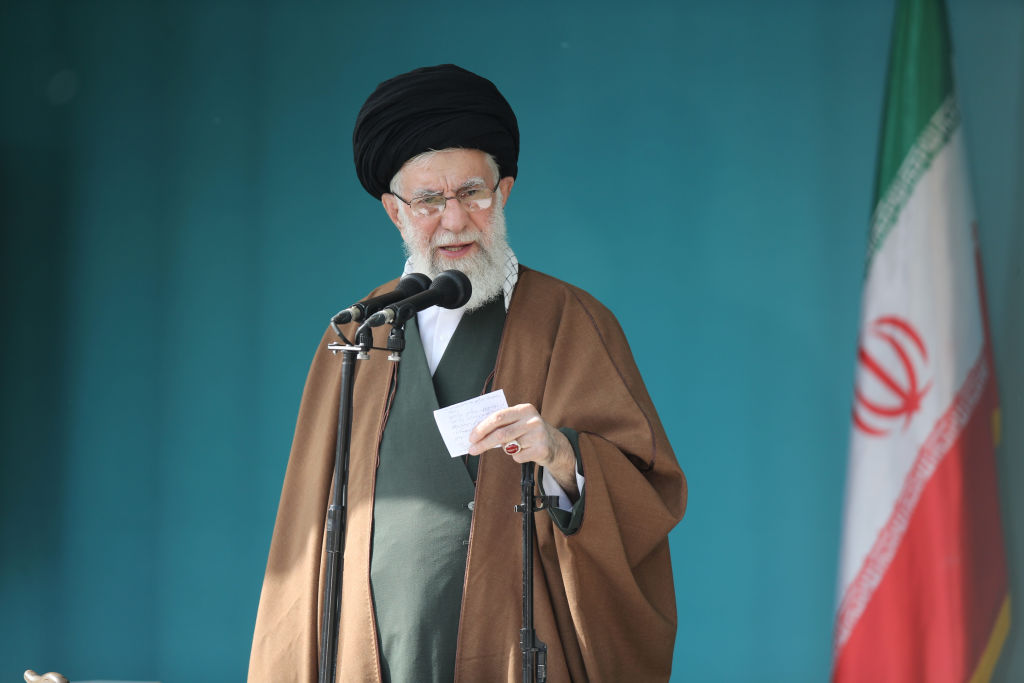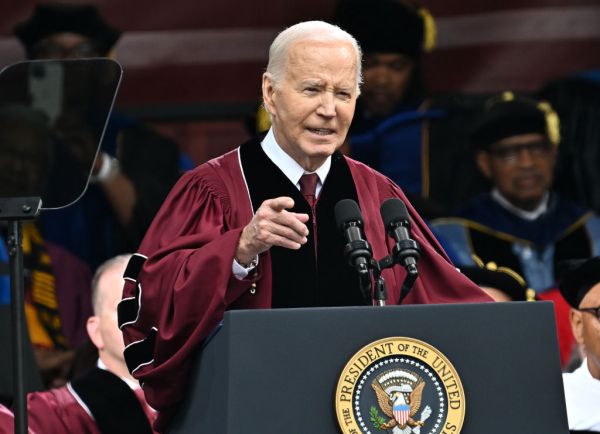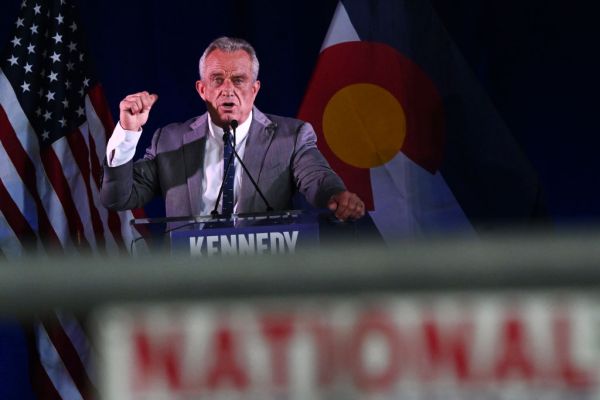Happy Monday! President Biden is cranking out new catchphrases faster than his own staff can figure out what they mean, ending a speech Friday by uttering, “Alright, God save the queen, man.”
Axios asked several current and former Biden aides over the weekend what the president was trying to convey. “Several gave different answers and some said they still aren’t sure.”
Quick Hits: Today’s Top Stories
- Secretary of State Antony Blinken arrived in Beijing Sunday, kicking off a two-day trip that marks the highest-level visit to China by a U.S. official since 2019. Blinken held talks with top Chinese foreign policy officials—including Foreign Minister Qin Gang and diplomat Wang Ayo—before meeting with Chinese President Xi Jinping on Monday. A State Department spokesman said this morning that the conversations were “candid, substantive, and constructive,” though no specifics have emerged on what was discussed.
- An Islamic State-linked militia attacked a school in western Uganda Friday night, killing at least 37 people—most of them students. Five militants belonging to a Congo-based extremist group known as the Allied Democratic Forces burned a dormitory and abducted six students, according to a Ugandan military spokesperson.
- The Food and Drug Administration told vaccine manufacturers last week to target the XBB.1.5 variant of COVID-19 in their fall booster campaign. The shot will represent the third variation of the COVID-19 vaccine and is predicted to be broadly effective against most Omicron strains of the virus still circulating in the United States. XBB.1.5 became the dominant strain for new infections earlier this spring.
- President Joe Biden announced Friday he plans to appoint Dr. Mandy Cohen, former North Carolina health secretary, to replace Dr. Rochelle Walensky as the head of the Centers for Disease Control and Prevention. Walensky announced last month she will step down at the end of June. The position does not currently require Senate confirmation, but it will beginning in 2025.
- The Department of Justice released a report Friday that found the Minneapolis Police Department engaged in a pattern of excessive force and discrimination against black and Native American citizens. The federal probe, prompted by the 2020 death of George Floyd at the hands of a police officer, will result in a consent decree—a court-monitored mandatory overhaul of the Minneapolis Police Department in collaboration with city officials.
- The Surfside, Florida, condo that collapsed in 2021 had serious deficiencies in its pool deck, according to preliminary findings from a federal investigation released last week. The pool deck was not built to code or to match the original plans, backing up one of several early hypotheses about the cause of the collapse that left 98 people dead.
- The College Board said Thursday it will not alter its Advanced Placement psychology course to comport with Florida’s expanded regulations on classroom instruction regarding gender and sexuality. The announcement from the College Board follows controversy in the spring over its African American studies course, which the Florida Board of Education alleged was in violation of the state’s laws on teaching critical race theory.
- Daniel Ellsberg, the Pentagon Papers leaker, died Friday at the age of 92. The documents he leaked to the New York Times, the Washington Post, and other outlets in 1971 revealed how four presidential administrations had expanded the war in Vietnam while misleading the U.S. public about their actions.
- Pope Francis was released from the hospital Friday, almost 10 days after he was admitted for an operation to remove a hernia and scar tissue. The pontiff, 86, was also hospitalized earlier this year with a respiratory infection.
- Wyndham Clark, a 29-year-old American with just one PGA Tour victory to his name, held off Rory McIlroy to win the U.S. Open Sunday at Los Angeles Country Club. Clark had never finished higher than 75th in a major.
Let’s Make a (Mini) Deal

Hand over heart, the Biden administration claims it is not seeking a nuclear deal with Iran.
“Rumors about a nuclear deal—interim or otherwise—are false and misleading,” State Department spokesman Matt Miller said Wednesday.
But the administration has reportedly been quietly talking to Iran since late last year, and National Security Adviser Jake Sullivan said in early May that it was “engaging Iran diplomatically regarding its nuclear program.” Now, according to the New York Times, the administration is reportedly seeking to exchange some sanctions relief for prisoner releases, an end to Iranian-backed attacks on U.S. contractors in the region, and—perhaps most importantly—constraints on Iran’s further nuclear development.
Despite what it may sound like, this wouldn’t be a deal. It would reportedly be an unwritten, totally informal understanding. For the Biden administration, that difference may describe the limited scope any understanding could have—but also a hope of avoiding the congressional opposition that would dog any formal agreement.
As we’ve reported previously, the Biden administration for about a year sought to update and revive the Joint Comprehensive Plan of Action (JCPOA), an Obama-era deal from which former President Donald Trump withdrew. But negotiations stalled out, and President Biden declared the deal dead during a November campaign stop.
Meanwhile, Iran continued its accumulation of nuclear material. After the United Nations’ International Atomic Energy Agency criticized Iran for its lack of cooperation with international supervision and excessive uranium enrichment, the country removed 27 of the IAEA’s monitoring devices. In March, the IAEA reported Iran had nearly 200 pounds of uranium enriched to 60 percent—well beyond the levels needed for civilian use—and the agency has detected some particles enriched to 83.7 percent. Uranium enriched to 90 percent is considered weapons grade, and the United States estimates Iran’s breakout period—the time needed to collect enough fissile material for a bomb—is now “weeks or less,” though building that material into a bomb could still take more than a year.
Iranian leaders don’t seem interested in rolling back this progress. Supreme Leader Ayatollah Ali Khamenei said last week he’s open to an agreement on Iran’s nuclear program, but that “the existing infrastructure of the industry should not be touched.” U.S. officials have reportedly warned Iran of consequences if it enriches to 90 percent, and according to the New York Times are considering a bargain in which Tehran promises not to enrich beyond 60 percent and to cooperate with IAEA inspectors.
Opponents of such an agreement point out that its reported terms are political, not technical—Iran would be promising not to go further rather than dismantling nuclear equipment or even stopping the enrichment to 60 percent it already has underway. “Iran has made many of the technical gains already,” Behnam Ben Taleblu, a senior fellow at the Foundation for Defense of Democracies, tells TMD. “This agreement would allow Iran to preserve the infrastructure, and infrastructure is key.”
Israeli officials, who vehemently opposed the JCPOA and consider the prospect of a nuclear-armed Iran an existential threat, have already voiced their opposition to the rumored interim agreement. Israeli Prime Minister Benjamin Netanyahu said Sunday that the “mini-agreements” being discussed “do not—in our view—serve the goal” of meaningfully restraining Iran’s nuclear program.
Nuclear enrichment isn’t the only bad Iranian behavior the U.S. wants to discuss. According to a New York Times report, the Biden administration also wants to stop Iran from giving Russia ballistic missiles, prevent its proxy terror groups from attacking American contractors in Iraq and Syria, and secure the release of three wrongfully detained Americans. The prisoner release may be within reach. After U.S. and Iranian officials negotiated through Omani diplomats, Oman Foreign Minister Sayyid Badr Albusaidi told Al-Monitor a prisoner agreement was “close.” “This is probably a question of technicalities,” he said.
In exchange for these steps from Iran, the United States is reportedly offering to unfreeze some Iranian assets—ostensibly for humanitarian aid use only—and not to add more sanctions, as well as to not push for punishments from the UN or IAEA. In what may have been an effort to ease tensions and smooth the path to an agreement, the United States recently approved a waiver allowing Iran to access about $2.7 billion in Iraqi energy payments—though Iran can only access the money for humanitarian aid, Miller said. The State Department spokesman cast the step as routine, “consistent with transactions that have taken place over—going back a number of years.” Meanwhile, existing sanctions against Iran haven’t kept its crude oil exports from surging this year—reportedly to more than 1.5 million barrels per day in May, though still below their 2.5 million bpd level before the U.S. withdrew from the JCPOA and restored sanctions.
However informal any imminent agreement may be, if it touches Iran’s nuclear program, the Biden administration will have trouble slipping it under Congress’ nose. House Foreign Affairs chairman Michael McCaul, Republican of Texas, sent a letter to Biden Thursday warning him to follow a 2015 law requiring the president to submit any Iran deal, “even informal,” to congressional review.
“Any deal that merely caps, rather than completely ends, Iran’s nuclear program represents a dangerous undermining of global nonproliferation norms,” McCaul argued. “This Administration is rewarding Iran’s bad behavior in exchange for a false promise of de-escalation.”
Remembering Charles
Five years ago this week, we lost the legendary columnist Charles Krauthammer. “Charles”—for the last decade of his life he had, like Oprah, Ichiro, and Elvis, reached single-name status in certain circles—was an enormous influence on many here at The Dispatch, and some of us were lucky enough to call him a friend.
Yesterday—Father’s Day—Charles’ son Daniel threw out the first pitch at Nationals Park in Washington to commemorate his dad and his devotion to D.C.’s baseball team. As part of the ceremony—which featured Daniel and his mother Robyn, as well as friends and relatives of the late Dr. Krauthammer—Fox News anchor Bret Baier narrated a touching video tribute that played on the scoreboard, and the Nationals unveiled a plaque commemorating Charles at the top of Section 128, where he had season tickets. We miss Charles a great deal, as well as his thoughtful and important contributions to the national debate.


Worth Your Time
- When was the last time you listened to AM radio? Although the technology is diminishing in popularity, Sen. Ted Cruz is working on legislation mandating all new cars be equipped with AM radio capabilities. “The idea violates all sorts of conservative principles,” Ryan J. Rusak argues in a piece for the Idaho Statesman. “Letting the market sort out customers’ needs and desires, minimizing costly regulations for businesses and allowing for variety rather than top-down conformity. The best argument that Cruz and his Senate collaborator, Democratic Sen. Edward Markey of Massachusetts, muster for their legislation is that many Americans’ most reliable access to emergency broadcast alerts is AM radio. But that specific need is better met by spreading broadband internet access, which would also improve education and remote-work opportunities. Cruz and Markey, who is as far to the left as the Texan is to the right, are touting the bipartisan support for their bill. In this case, bipartisan isn’t a synonym for good or smart but rather for a point where conservatives and progressives can agree on flexing government power—and the political benefits of doing so.”
- In honor of Juneteenth being observed today, take a few minutes to (re)read this June 2021 G-File from Jonah on the nation’s newest federal holiday. “I’m at a loss to understand why celebrating the end of slavery is anything but good. In particular, I’m at a loss to understand why seeing white Americans celebrate the end of slavery is anything but good,” he wrote. “Making Juneteenth an American holiday and not just a black holiday underscores that Americans—all Americans—are (or should be) rightly proud that we did away with an institution existentially at war with the best version of ourselves. For those who talk about slavery as if it never shrinks in the rearview window no matter how far behind us it gets, that could be an awkward talking point to work around. It’s harder to claim that ‘white America’ hasn’t acknowledged the evil of slavery when all Americans celebrate the end of slavery and the liberation of our fellow Americans.”
Presented Without Comment
NBC News: Pence ‘Always Hoped’ Trump Would Have ‘Come Around’ on Accepting 2020 Election Results
Also Presented Without Comment
Wall Street Journal: Pickleball Diehards Are Choosing Vacations Based On Where They Can Play
Also Also Presented Without Comment
Boston Globe: Case of Stolen Body Parts From Harvard Medical School Morgue Began With a Tip From an Ex-Lover
Toeing the Company Line
- In the newsletters: The Dispatch Politics team covered former Vice President Mike Pence’s reaction to the Trump indictment and Republican prospects in Maine’s 2nd congressional district, Jonah examined Republicans’ widespread belief that the system is rigged against Donald Trump, Nick wondered (🔒) if Ron DeSantis isn’t running out of time to make his move, and Chris warned against (🔒) making straight-line predictions in the GOP 2024 primary contest.
- On the podcasts: Jonah ruminated on gender and other hot-button issues on The Remnant, Sarah was joined by Judge Amul Thapar to discuss his new book on Advisory Opinions, and Mike spoke with former Rep. Peter Meijer about the security issues surrounding Trump’s retention of classified documents for The Dispatch Podcast.
- On the site over the weekend: Luis returned to a beloved Seamus Heaney poem in honor of Father’s Day and Peter Meilaender reviewed a new book about the first year of the war in Ukraine.
- On the site today: Charlotte digs into continued efforts by Turkey and Hungary to obstruct Sweden’s NATO bid, and Jacob looks at debates over whether to reauthorize a key section of the Foreign Intelligence Surveillance Act. Plus, Chris marks Juneteenth by reflecting on the deferred costs of American slavery.
Let Us Know
We hope all the dads out there had a wonderful Father’s Day yesterday!
Tell us about a moment you shared with your dad that might have seemed insignificant or routine at the time but has stuck with you over the years.









